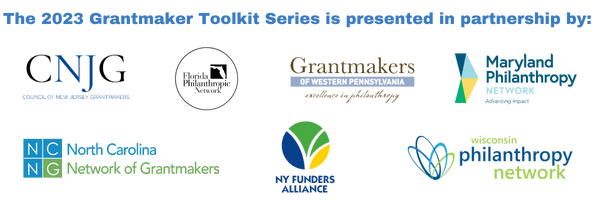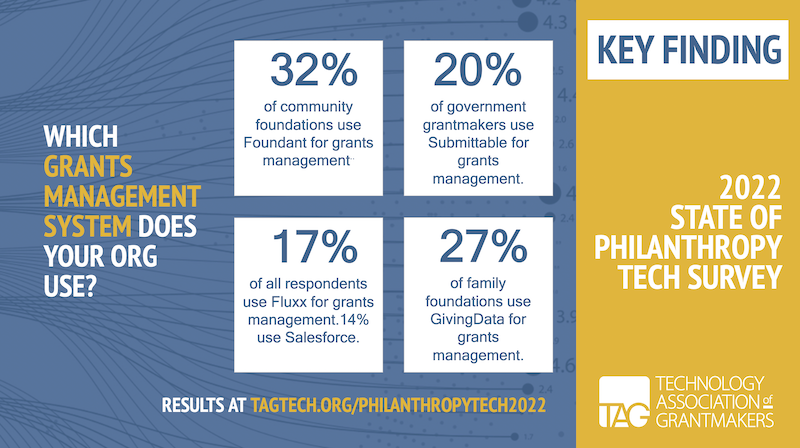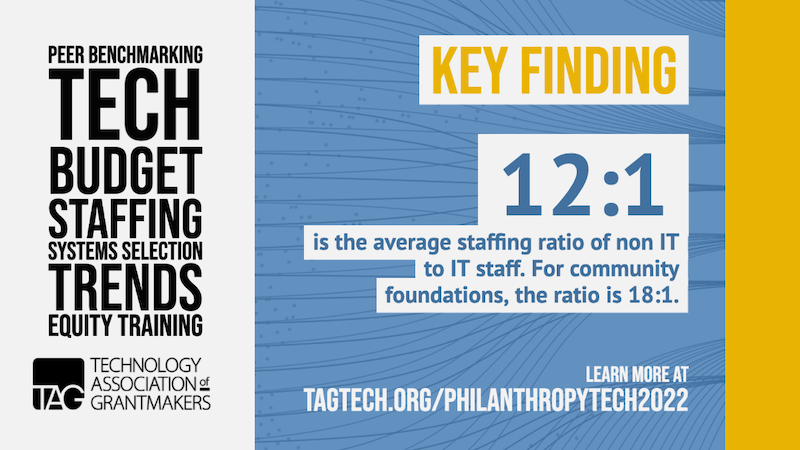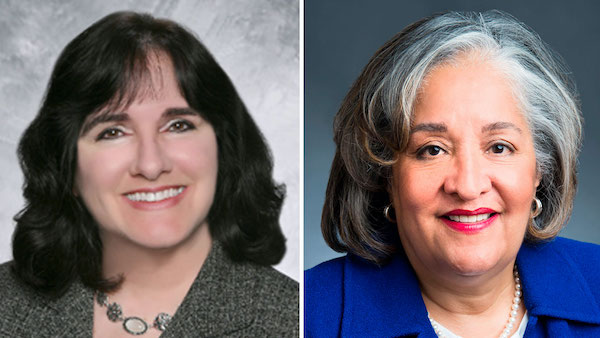Site Search
- resource provided by the Forum Network Knowledgebase.
Search Tip: Search with " " to find exact matches.
"What is the ongoing impact of social change on grantmaker support for grantees? How common is it for foundation staff to be back in the office? How can I leverage peer benchmarking to advocate for change within my organization?”
In July 2022, Technology Association of Grantmakers (TAG) conducted a survey to better understand the technology environment, practices, and perceptions in philanthropy. Now in its third version, the 2022 State of Philanthropy Tech survey compiled results from 277 grantmaking organizations throughout North America, the EU, and UK. The findings are fascinating!
Topics covered include:
· Technology budgeting and staffing
· Staff turnover and retention
· Remote, hybrid, and in-person work trends
· Cybersecurity breaches, training, and protections
· Trends in tool selection for grants management, remote work enablement, and more
Join TAG executive Director, Chantal Foster, and TAG Survey Committee Member, Tess Hanrahan of the Hewlett Foundation, for this interactive webinar that will explore key findings and trends just in time for your 2023 planning. TAG cultivates the strategic, equitable, and innovative use of technology in philanthropy. Their work builds knowledge, strengthens networks, and advances the social sector.
This program is for members of the following philanthropy-serving organizations: Maryland Philanthropy Network, Council of New Jersey Grantmakers, Florida Philanthropic Network, Grantmakers of Western Pennsylvania, Philanthropy Wisconsin, NY Funders Alliance, and North Carolina Grantmakers.
Webinar Recording
TAG’s State of Philanthropy Tech Survey Presentation Slides (and attached)
2022 State of Philanthropy Tech Survey
6 Tech Trends to Watch in Philanthropy
Selecting Systems for Community Foundations
Favorite Productivity Apps of Webinar Participants: Asana, Microsoft Planner, Calendly, Slack, Evernote, iCalender, Google Calendar, Doodle, DownDetector, Trello, Outlook, Monday.com, Microsoft Bookings, Docusign, OneNote
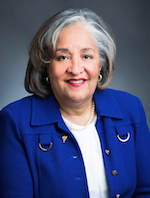 New Jersey’s largest philanthropic association has named longtime social sector leader Maria Vizcarrondo as its president.
New Jersey’s largest philanthropic association has named longtime social sector leader Maria Vizcarrondo as its president.
“Maria has been a trailblazer throughout her career,” said Council of New Jersey Grantmakers Board Chair William V. Engel. “We turn to her to help the state’s diverse and dedicated philanthropies to be even more effective in their quest to make this a better place.”
The Council of New Jersey Grantmakers is a nonprofit organization of over 130 members representing the philanthropic community in the state. Members include family, private, community, independent and corporate foundations, and corporate giving programs.
The Council exists to strengthen and promote effective philanthropy throughout New Jersey. CNJG’s programs and resources increase the impact of organized philanthropy’s support for adequate health care, quality education, a cleaner environment, community development, historical preservation, disaster response and relief, research, recreation, culture, and other areas crucial to the fabric of New Jersey's communities.
“I am very excited about joining the Council of New Jersey Grantmakers as its CEO and working with dynamic individuals — many of whom I have known and respected throughout my nonprofit career,” Ms. Vizcarrondo said. “Most importantly, I look forward to forging partnerships that will advance the Council’s social impact as a sector leader in New Jersey communities, the region, and nation.”
Ms. Vizcarrondo, who spent most of her career in northern New Jersey, comes to the Council from Cabrini University in Philadelphia, where she most recently was Director of Community Development and External Relations. She was inaugural Executive Director of the school’s Nerney Leadership Institute, launched in 2013.
Ms. Vizcarrondo brings more than 25 years of experience transforming service organizations and has served her communities as both an appointed and elected official.
In 2006, when he was first elected Mayor of Newark Cory Booker tapped Ms. Vizcarrondo to head Newark’s Health and Human Service Department, the largest of its kind in New Jersey. One of her first actions in that role was to develop a Children’s Bill of Rights to benchmark improvements in the lives of children and families throughout the city. Her accomplishments included securing state funding to establish Family Success Centers to provide neighborhood- based services, and launching a major citywide campaign to raise the immunization rates of Newark’s children.
Prior to her mayoral appointment, Ms. Vizcarrondo served as the first woman president and CEO of United Way of Essex and West Hudson. Her pioneer work in re-engineering the organization’s mission into community building was documented in the United Way Transformation Diaries. In the aftermath of the 9/11 attacks, Ms. Vizcarrondo led the New Jersey United Ways in a statewide coordination of services for affected families and managed the distribution of corporate funding for these efforts.
She was elected Essex County Surrogate in 1993 and served four years of a five-year term before leaving to join United Way.
Ms. Vizcarrondo has been listed among the “100 Most Influential People in New Jersey” and was a founding member of the New Jersey Institute for Social Justice.
###
Joint Statement from CNJG and the Center for Non-Profits
This statement also appeared on NJ Spotlight.
A conversation between two customers in line at a New Jersey supermarket turned ugly when one man denigrated the other with a racial slur and blamed the fellow shopper for the coronavirus pandemic.
With so much else going on these days, it would be so easy to react to such a seemingly minor incident by saying, oh well, these things happen. Times are tough; tempers are short.
But shrugging our shoulders is not an option. Doing so is complicity in a wrongful acts that too often are repeated, over and over. Our silence merely emboldens those who would tear apart the fabric of our society, whether through hate or ignorance – or the extremely volatile mix of the two.
It’s not difficult to connect the dots between “little” incidents and the systemic racism that leads to tragedies like the killing of George Floyd in Minneapolis. When we ignore or accept any examples of people being demeaned over what they look like or where they (or their ancestors) came from, we only open the door for massive abuses and the wrenching reckoning that follows them.
We mustn’t be cowed by fear of being seen as overly sensitive or labeled “politically correct.” This is about being morally and ethically correct in the face of bias and hatred – and that shouldn’t be too much to ask of Americans, regardless of their political party or ideology.
As state Attorney General Gurbir Grewal said recently, “COVID-19 is no excuse for racism, xenophobia, or hate. Discrimination and harassment in violation of New Jersey law remains illegal even if it occurs against the backdrop of a global pandemic." It’s gratifying to live in a state where the top law enforcement officer speaks out this way.
Unfortunately, it also is a state where reported hate crimes are up in recent years. We can’t tolerate such behavior, whether by police, elected officials or “average people.” There is too much at stake for bias to become the new normal.
As the leaders of the major philanthropic and non-profit membership organizations in New Jersey, representing both the wide range of non-profit groups and the multi-faceted funders of those groups, we feel compelled to speak out against the hateful responses we and our members have witnessed in reaction to the COVID-19 Pandemic.
Our country has seen countless examples of selfless sacrifice and good works over the past weeks, both on individual and institutional levels. We are proud that the members our organizations have been leaders in responding to the needs of our community.
But to our distress, some individuals are using the pandemic to put forward their bias and hatred toward their fellow citizens.
Times of crisis bring to the surface, on the part of some people, the need to scapegoat. Often, this takes the form of lashing out at particular groups, stirred up by inflamed rhetoric or more subtle code words or phrases, having no relationship to facts. In this time, there have been verbal and physical attacks against people of Asian and Pacific Islander background, as there were against Muslims after September 11 and against African-Americans and Latinos in countless other instances. This hatred and these attacks must stop.
The non-profit sector is the backbone of our communities, providing assistance and education to a wide range of people, in good times and especially in challenging times. Many of these services are a lifeline to people of all backgrounds, religions, ethnicities and statuses in life.
Non-profit organizations are the vehicle through which people can work together to selflessly assist others. People around the world view the United States as being unique in the breadth and depth of its charitable and philanthropic work, engaging the talents of all individuals, regardless of their economic or social status.
We call upon all people of good conscience in their good work to be alert for hateful words and actions and – always -- to speak out against them, both as individuals and as organizations.
Our language and our actions do matter.
Everyone, and especially people in positions of public trust or prominence, has the obligation to use our works and our lives to assist all in need and to honor the dignity and potential of all those we meet.
We call on not only our own members, but everyone who serves and volunteers in our sector to join us in this effort to speak out against racism and hatred and to exemplify all the best that we know our country is.
Maria Vizcarrondo
CNJG CEO and President
Linda Czipo
Center for Non-Profits CEO and President
William V. Engel
CNJG Board Chair
Gina M. Plotino
Center for Non-Profits Board Chair
CNJG joined over 350 delegates from across the country for Foundations on the Hill on February 23-26. The event included a policy conference followed by meetings on Capitol Hill. Our delegation was a nice mix of newcomers to FOTH and those with years of experience.
Joining me this year were Board Chair Craig Drinkard; Sharnita Johnson, Victoria Foundation; Board Secretary Kortney Swanson Davis, Forman Acton Foundation; Board members, Jeremy Grunin, Grunin Foundation, and Lucy Vandenberg, Schumann Fund for New Jersey; Bill Engel, The Union Foundation; Carrie Bersak and Jessica Nugent, The Burke Foundation; Sharif Braxton, EQUIP NJ; Naeema Campbell, The Fund for New Jersey; Alma Garcia and Hellen Zamora-Bustos, Equity Ahora (formerly New Jersey Health Initiatives); Jessica Johansen and Shelley Skinner, The Tepper Foundation; Sharese York, Smith Family Foundation; Nelida Valentin, Princeton Area Community Foundation; and Renee Woodside, The Horizon Foundation for New Jersey.
For the last few years, we’ve also been joined by Linda Czipo, President and CEO, New Jersey Center for Nonprofits. Linda’s voice elevates our conversations and helps ground them in the work nonprofits do every day.
Speaking with one voice, we urged our legislators to sign on to the bipartisan Charitable Act (H.R.801/S.317). Congressman Kean co-signed the bill on March 3, 2025. We also took the opportunity to share with our Congressional delegation how changes in federal policy and various executive actions are impacting nonprofits and the communities we collectively serve.
In advance of FOTH, the Center surveyed NJ nonprofits for the New Jersey Nonprofits Trends and Outlook 2025 Report – just released this morning! As part of their survey, they also asked for on-the-ground stories of impact in the face of federal funding freezes and actions from the executive branch. Here’s a sampling of what they heard and what we shared at FOTH:
“As of 2/12/25 our agency had not received over $1.5 million owed on federal contracts for work performed in December and January, and on 2/11/25 we furloughed 46 employees … There are currently 1,000 children in NJ who need services in the database for unaccompanied minors where our program staff are assigned cases…If staff are furloughed or laid off these children will not receive services.”
“It was terrifying--a payroll week. We were afraid that we would not be able to pay contractors for work they had already done. Our refugee assistance programs, which had just expanded, lost funding. We were afraid that we would not be reimbursed for $100,000 in disbursements … we had to let go 2 brand new staff members.”
“[Organization] receives federal funding administered by the state and counties (Aging funds and Ryan White funds). If we lose those funds, we will not be able to serve seniors in Ocean and Union County or people living with HIV in 8 counties in NJ.”
“Our federal grants comprise of about $900,000 in total. These funds are our main lifeline for our mental health counseling and sexual violence programming. Especially those who are already marginalized, underserved and/or at risk are more vulnerable to the funding uncertainties than any other groups…”
FOTH is always an opportunity for us to discuss issues of interest to philanthropy, advocate for policy and legislation that strengthen the philanthropic and nonprofit sectors and build relationships with legislators.
This year, we also had a moral obligation to ring the alarm and make sure our representatives understood how communities are being impacted by a wave of reckless and destructive policy decisions.
Earlier this morning, the Center presented their webinar, "The State of NJ’s Nonprofit Sector", providing a high-level review of the related report. Nearly two-thirds of survey respondents reported that at least some of their funding comes from federal grants or contracts which account for more than 4,500 jobs. These findings tell us that people’s lives and livelihoods are at stake.
The webinar provided a concise list of what funders can do during these especially challenging times:
- Check in with nonprofit partners.
- Provide flexible funding.
- Simplify applications and reporting processes.
- Connect nonprofits to information/guidance (Start here with Resources to Navigate Uncertainty).
- Fund advocacy.
- If possible, please increase your payout.
These recommendations align with Doing Good Better and so much of what we’re hearing from CNJG members and the broader philanthropic sector.
As foundation leaders dedicated to our New Jersey communities, please consider the full range of strategies your organizations can employ during these truly unprecedented times. Manager of Communications Shakirat Odunsi will collect stories from you, our members, about how you are changing/adapting your grantmaking and work in the face of the dramatic policy shifts that are happening in the executive branch. I also encourage you to share those stories directly with your CNJG colleagues via the listservs.
My colleague Linda ended the webinar with, “We are not alone. We can do this together!” And I’ll add - in fact, we must do this together.
In solidarity,
Theresa Jacks, President and CEO
Council of New Jersey Grantmakers
A CNJG member queried the corporate listserve on strategies or resources for virtual volunteering. CNJG compiled these responses, and listed the different opportunities that members are offering for employee volunteerism.
Sample conflict of interest policies for Community Foundations.
CNJG joined delegates from the across the country for Foundations on the Hill on February 25 - 28. The event included a policy conference followed by meetings on Capitol Hill.
Joining me, the CNJG delegation included Bill Engel, President, The Union Foundation; Sharnita Johnson, Vice President of Strategy, Impact and Communications, Victoria Foundation; Melissa Litwin, Early Childhood Program Director, The Henry and Marilyn Taub Foundation; Jessica Nugent, Senior Program Officer, Burke Foundation; Jonathan Pearson, Executive Director, and Renee Woodside, Senior Program Officer, The Horizon Foundation for New Jersey; Danielle Scott, President and CEO, and Bruce Rubin, Trustee, Pincus Family Foundation; Kortney Swanson Davis, President and CEO, Forman S. Acton Educational Foundation; Catherine Wilson, President and CEO, United Way Greater Newark; Alana Vega, Program Officer, and Hellen Zamora-Bustos, Leonard Lieberman Philanthropy Fellow/Program Associate, Fund for New Jersey; Nelida Valentin, Vice President - Grants & Programs, Princeton Area Community Foundation; and Lucy Vandenberg, Executive Director, Schumann Fund for New Jersey.  Bill and Lucy serve as co-chairs of the CNJG Policy Committee. For the last few years, we’ve also been joined by Linda Czipo, President and CEO, New Jersey Center for Nonprofits. Linda’s voice elevates our conversations and helps ground them in the work nonprofits do every day.
Bill and Lucy serve as co-chairs of the CNJG Policy Committee. For the last few years, we’ve also been joined by Linda Czipo, President and CEO, New Jersey Center for Nonprofits. Linda’s voice elevates our conversations and helps ground them in the work nonprofits do every day.
The 21st Annual Foundations on the Hill, hosted and presented by United Philanthropy Forum in partnership with Independent Sector and the Council on Foundations, is the largest annual public policy and advocacy conference dedicated solely to the philanthropic sector. In addition to meeting with legislators and government officials, FOTH attendees attended pre-conference programming, conference keynotes, expert panel sessions, and several receptions. As part of the conference programming, we learned about the All By April campaign, a nonpartisan effort encouraging philanthropy to make grants to nonprofits conducting election work by the end of April. The authors and researchers of the just released 2024 National Study on Donor-Advised Funds provided an overview of their key findings. We were introduced to the history and priorities of the Black Congressional Caucus Foundation, and their focus on developing thoughtful, creative and informed leaders. And we were reminded about the chilling impact recent Supreme Court rulings could have on the rights of donors to give in ways that align with their values.
We were pleased to meet with all 12 of our NJ Congressional and both Senate offices. We met directly with Congressmen Gottheimer and Kean, along with a quick photo meet-up with Senator Booker.
As part of our meetings, we advocated for the Charitable Act, H.R.3435/S.566 which would provide a non-itemizer deduction of up to 1/3 of the standard deduction; the Nonprofit Stakeholders Engaging and Advancing Together (SEAT) Act, H.R.3245, which would pave the way for stronger policymaking input from the charitable sector and improved data collection about nonprofits; and the Streamlining Federal Grants Act, H.R.5934/S2286, which would simplify the application and reporting requirements for federal grants. These bills strengthen the work of the philanthropic and nonprofit sectors.

 In addition to advocating for legislation that supports our work, and educating Congress about the social sector, FOTH not only helps build relationships with our Congressional delegation, but also provides opportunities for CNJG members to get to know one another. Our annual CNJG FOTH dinner is a time to relax and debrief about our meetings. New this year, a few of us took the opportunity to see Washington by moonlight.
In addition to advocating for legislation that supports our work, and educating Congress about the social sector, FOTH not only helps build relationships with our Congressional delegation, but also provides opportunities for CNJG members to get to know one another. Our annual CNJG FOTH dinner is a time to relax and debrief about our meetings. New this year, a few of us took the opportunity to see Washington by moonlight.
This year we were thrilled to welcome several CNJG members new to the FOTH experience!
 We’re also thrilled to welcome a new CNJG team member, Shakirat Odunsi, Manager of Communications! With over 20 years of experience in the marketing and communications field, Shakirat will lead and manage our communications strategy, marketing efforts for CNJG events, services and offerings, and our website and social media channels. Shakirat can be reached at [email protected].
We’re also thrilled to welcome a new CNJG team member, Shakirat Odunsi, Manager of Communications! With over 20 years of experience in the marketing and communications field, Shakirat will lead and manage our communications strategy, marketing efforts for CNJG events, services and offerings, and our website and social media channels. Shakirat can be reached at [email protected].
It was quite an eventful 3+ days. Thank you to the CNJG FOTH delegation for sharing your time and expertise. I’m proud that we were part of over 300 voices attending FOTH from across the country, sharing philanthropy’s positive impact, advocating for the nonprofit sector, and supporting legislation that strengthens our work.
Another important platform to strengthen and inform both the philanthropic and nonprofit sector in NJ is on June 18. The Spring Colloquium - Empowering the Future: Harnessing AI and Data for Philanthropic Social Impact, will explore how AI can enhance problem-solving without losing human connections, how it affects equity, and how philanthropy has engaged with AI for funding initiatives. Save the date – registration will be available soon!
Sincerely,
Theresa Jacks, President and CEO
Council of New Jersey Grantmakers
Foundations Facilitate Diversity, Equity, and Inclusion: Partnering with Community and Nonprofits, a new report by the OMG Center for Collaborative Learning, confirms that foundations can, in fact, facilitate diversity, equity, and inclusion (DEI) through their grantmaking processes and their partnerships with nonprofits—and identifies eight specific practices for foundations to emulate.
The report takes a deep dive into the work of nine foundations that represent a diverse cross-section of types and sizes, and offers useful lessons about how foundations can better partner with nonprofits to be more effective in their work.
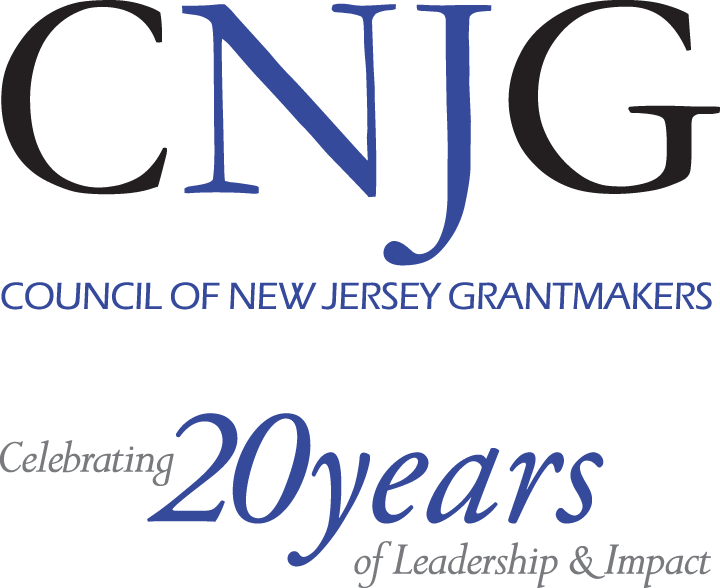 CNJG celebrates its 20th anniversary in 2017 marked by extraordinary progress and service to members over this time. As the nexus for the philanthropic community in New Jersey, the Council of New Jersey Grantmakers’ body of work grows more robust every year. This is clearly evident by the exponential growth in programs and services since CNJG was founded in 1987. However, this proliferation in programs and services does not reflect the full realm of CNJG's transformation over twenty years. CNJG has evolved to become a leader in the state, spearheading important and significant initiatives throughout our history.
CNJG celebrates its 20th anniversary in 2017 marked by extraordinary progress and service to members over this time. As the nexus for the philanthropic community in New Jersey, the Council of New Jersey Grantmakers’ body of work grows more robust every year. This is clearly evident by the exponential growth in programs and services since CNJG was founded in 1987. However, this proliferation in programs and services does not reflect the full realm of CNJG's transformation over twenty years. CNJG has evolved to become a leader in the state, spearheading important and significant initiatives throughout our history.
These programs, services and leadership initiatives elevate, not only our members’ work and practice, but also grantmakers throughout New Jersey, and even beyond. CNJG's success stems from its ability to broker partnerships and alliances to solve problems, leverage shared resources, and forge sustainable solutions to bring about long-term change. During its 20 years, CNJG has grown to become a valuable, highly relevant leadership organization serving a diverse range of funders. View our CNJG Through the Years pictorial. CNJG thanks our members and partners for your ongoing support and leadership that has propelled us through the last 20 years. We look forward to the next twenty!
Newark Philanthropic Liaison
Philanthropy has played a vital role in Newark for decades. In 2007, in collaboration with the Office of the Mayor, CNJG hired the city’s first liaison – modeled after a similar position in the State of Michigan – to harness interest, foster greater effectiveness and attract resources toward policy and programmatic areas that affect Newark’s residents. In the years since, the Council’s Newark Philanthropic Liaison has become a model for the country.
Hurricane Sandy Response
Superstorm Sandy officially came ashore in New Jersey on October 29, 2012 at 8:00 p.m. and its aftermath continues to be felt in communities throughout our state. Not 24 hours after the storm made landfall, CNJG began planning a series of actions to help inform funders what to be prepared for, share information and discuss strategies. CNJG's support of the philanthropic community as it navigates the shifting landscape of disaster recovery, continues.
Facing Our Future
Facing Our Future was a landmark initiative looking at the systemic, long term fiscal challenges facing all levels of government in New Jersey. It grew out of a 2010 briefing CNJG held for members that outlined how a Governor’s budget is annually crafted. CNJG leadership worked with members to convene a group of enthusiastic former government leaders. Their collective experience crossed party lines, and many of them had served multiple New Jersey governors. This Leadership Group included 4 former Attorney Generals, 3, former Commissioners, 2 former State Treasurers, a former Director of the State Senate and a former Chief Justice of the NJ Supreme Court, in addition to leading New Jersey researchers.
Establishing South Jersey’s Community Foundation
The Community Foundation of South Jersey formally launched in 2009 after two years of extensive planning through the efforts of CNJG and a number Council members. CFSJ is dedicated to the southernmost counties of New Jersey - Atlantic, Burlington, Camden, Cape May, Cumberland, Gloucester, Ocean, and Salem. These counties are exceptionally diverse, stretching from rural farm lands to pockets of densely populated and poor urban areas, juxtaposed against wealthy suburban communities. However, they share many of the same social problems – a challenging economy, unengaged youth, access to healthcare, as well as issues related to hunger, unemployment and housing. Realizing the need, Council members through the work of CNJG formed The Community Foundation of South Jersey. CNJG is extremely proud to have played a role in building the foundation to serve South Jersey for generations to come.
Spring Colloquium
Held for the first time in 2008, CNJG's Spring Colloquium focuses on critical trends and issues affecting foundations and the people and communities they serve. Past discussions have featured Governor Tom Kean with US Editor for the Economist Matthew Bishop, writer David Borestein and philosopher Anthony Appiah, and Idealist.org founder Ami Dar with Cindy Rizzo of the Arcus Foundation.
Spring Conference
CNJG's Conference for Grantmakers brings together staff and trustees of all types and sizes of foundations for a day of networking and focused sessions dealing with key aspects of grantmaking, leadership, and management and operations.


